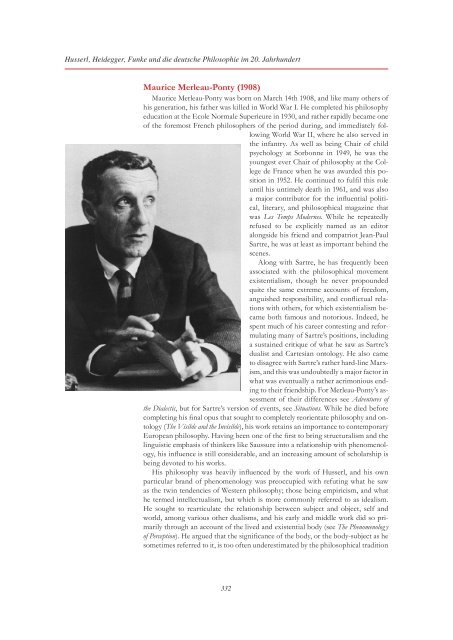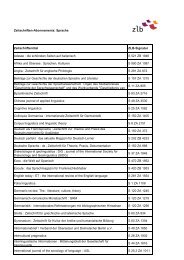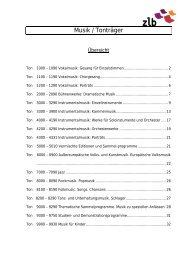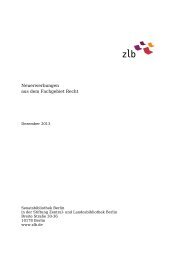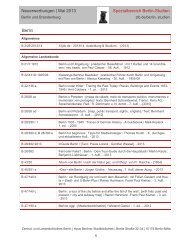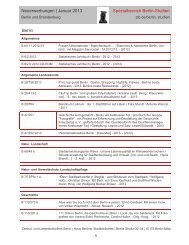12. Exkurs: Die Frankfurter Schule - Zentral- und Landesbibliothek ...
12. Exkurs: Die Frankfurter Schule - Zentral- und Landesbibliothek ...
12. Exkurs: Die Frankfurter Schule - Zentral- und Landesbibliothek ...
Sie wollen auch ein ePaper? Erhöhen Sie die Reichweite Ihrer Titel.
YUMPU macht aus Druck-PDFs automatisch weboptimierte ePaper, die Google liebt.
Husserl, Heidegger, Funke <strong>und</strong> die deutsche Philosophie im 20. Jahrh<strong>und</strong>ert<br />
Maurice Merleau-Ponty (1908)<br />
Maurice Merleau-Ponty was born on March 14th 1908, and like many others of<br />
his generation, his father was killed in World War I. He completed his philosophy<br />
education at the Ecole Normale Superieure in 1930, and rather rapidly became one<br />
of the foremost French philosophers of the period during, and immediately following<br />
World War II, where he also served in<br />
the infantry. As well as being Chair of child<br />
psychology at Sorbonne in 1949, he was the<br />
youngest ever Chair of philosophy at the College<br />
de France when he was awarded this position<br />
in 1952. He continued to fulfil this role<br />
until his untimely death in 1961, and was also<br />
a major contributor for the influential political,<br />
literary, and philosophical magazine that<br />
was Les Temps Modernes. While he repeatedly<br />
refused to be explicitly named as an editor<br />
alongside his friend and compatriot Jean-Paul<br />
Sartre, he was at least as important behind the<br />
scenes.<br />
Along with Sartre, he has frequently been<br />
associated with the philosophical movement<br />
existentialism, though he never propo<strong>und</strong>ed<br />
quite the same extreme accounts of freedom,<br />
anguished responsibility, and conflictual relations<br />
with others, for which existentialism became<br />
both famous and notorious. Indeed, he<br />
spent much of his career contesting and reformulating<br />
many of Sartre’s positions, including<br />
a sustained critique of what he saw as Sartre’s<br />
dualist and Cartesian ontology. He also came<br />
to disagree with Sartre’s rather hard-line Marxism,<br />
and this was <strong>und</strong>oubtedly a major factor in<br />
what was eventually a rather acrimonious ending<br />
to their friendship. For Merleau-Ponty’s assessment<br />
of their differences see Adventures of<br />
the Dialectic, but for Sartre’s version of events, see Situations. While he died before<br />
completing his final opus that sought to completely reorientate philosophy and ontology<br />
(The Visible and the Invisible), his work retains an importance to contemporary<br />
European philosophy. Having been one of the first to bring structuralism and the<br />
linguistic emphasis of thinkers like Saussure into a relationship with phenomenology,<br />
his influence is still considerable, and an increasing amount of scholarship is<br />
being devoted to his works.<br />
His philosophy was heavily influenced by the work of Husserl, and his own<br />
particular brand of phenomenology was preoccupied with refuting what he saw<br />
as the twin tendencies of Western philosophy; those being empiricism, and what<br />
he termed intellectualism, but which is more commonly referred to as idealism.<br />
He sought to rearticulate the relationship between subject and object, self and<br />
world, among various other dualisms, and his early and middle work did so primarily<br />
through an account of the lived and existential body (see The Phenomenolog y<br />
of Perception). He argued that the significance of the body, or the body-subject as he<br />
sometimes referred to it, is too often <strong>und</strong>erestimated by the philosophical tradition<br />
332


